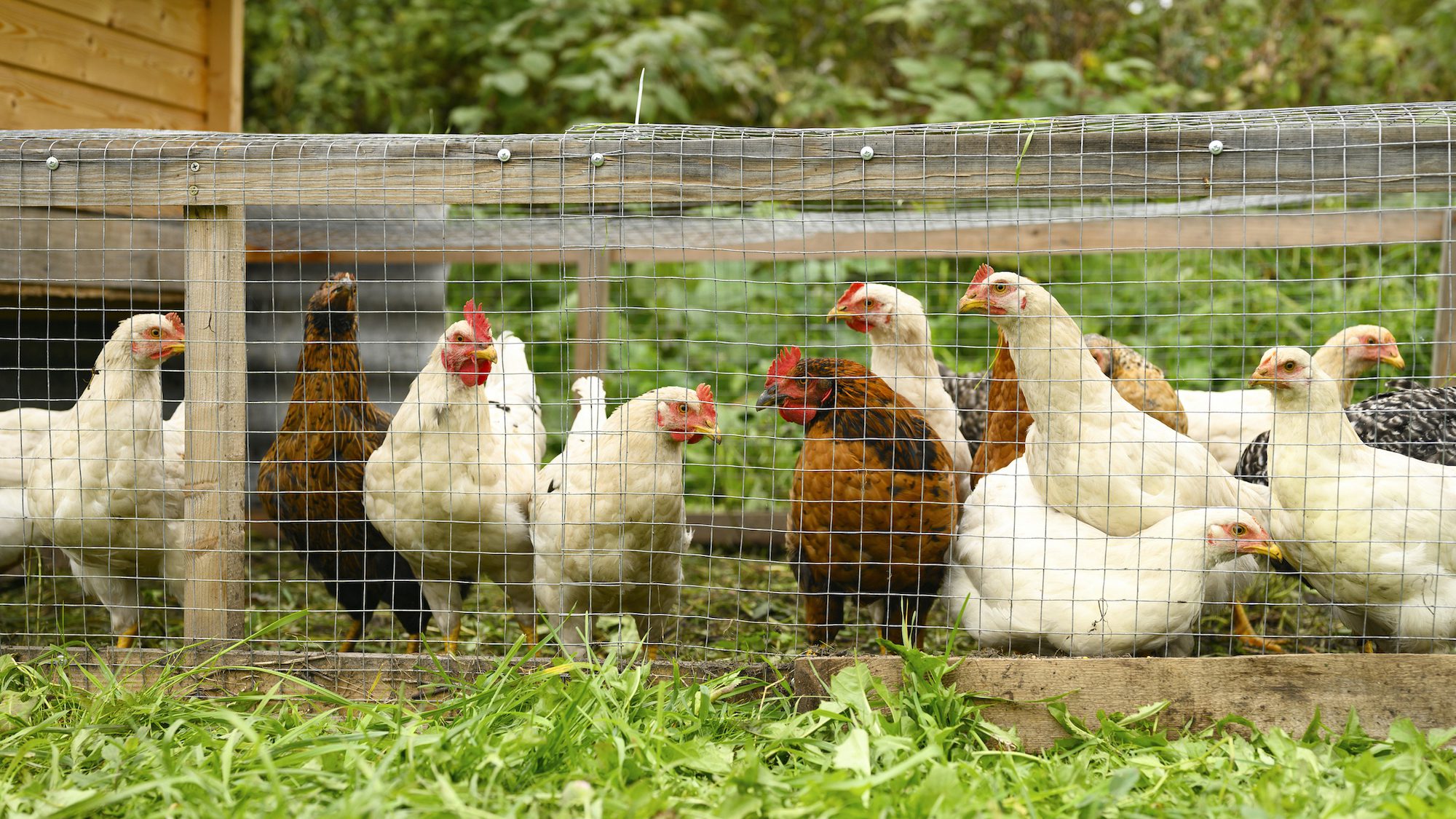
Getty Images
The COVID-19 pandemic drove a lot of people to seek new hobbies in their own backyards—even raising their own chickens. But many of these newly minted chicken farmers may be blissfully unaware that their backyard buddies can be dangerous.
The New York Times recently reported on a salmonella outbreak that infected 163 people and led to 34 hospitalizations across 43 states—all due to the unsafe handling of backyard chickens.
Whether you just started raising chickens or you’re getting ready to build your first coop, we want to help you do it safely. Here are six common mistakes first-time chicken owners make, and some expert tips on how to avoid them.
1. Treating your chickens like pets
Although they might look fluffy and innocent, chickens can carry a lot of harmful germs and bacteria that are dangerous to humans—especially those with weakened immune systems, such as children and older adults.
“Salmonella and E. coli aren’t the only risks,” says Joe Aitken, lead editor of PetMag. “Histoplasmosis and the bird flu are two others.”
Histoplasmosis can cause pneumonia-like symptoms in vulnerable groups, while bird flu is rare these days but can lead to serious complications.
Name your chickens if you must, but that’s about as far as you should go in terms of treating them like pets.
“Never kiss your chickens or allow them to nuzzle your face,” says Aitken. “You also shouldn’t let your chickens inside your house, or touch your face or mouth when handling them. For this reason, it’s also a good idea not to leave young children unsupervised around poultry.”
And in case it wasn’t clear enough—this also means washing your hands really well after handling your chickens or any of their stuff.
2. Not keeping things really clean
Besides hand-washing and keeping chickens away from your face, you should also invest the time into keeping your chicken coop really clean—especially since this is where a lot of that dangerous bacteria builds up.
“You should regularly disinfect any surface where your chickens love spending time,” says Elle Meager, founder and CEO of Outdoor Happens. “Keep your coop tidy so disease can’t fester, and when you’re cleaning the coop, try not to let your chickens or their coop accessories inside your home.”
Accessories like cages, water containers, toys, or cleaning equipment should always remain outside your home if possible.
Rather than washing things inside, Meager suggests creating a dedicated cleaning area outside. This will allow you to keep your chicken coop clean, without introducing any harmful bacteria into your home.
3. Not having the proper equipment
Chickens aren’t like cats or dogs, and before bringing any into your backyard, you’ll want to spend some time doing research and making sure you have everything you need to properly take care of them.
“While raising chickens may seem like a fun, easy, and simple hobby, there’s a lot of work involved in keeping both you and your birds safe,” says Aitken.
For example, you’ll want to be sure to build a sturdy and predator-proof coop before bringing your chickens home.
“A cheap chicken fence won’t offer enough protection,” says Meager. “Your flock needs an enclosed chicken coop with a sturdy roof.”
She also recommends scanning your coop for any tiny holes that an egg thief like a rat or weasel could squeeze through. On that note…
4. Forgetting about predators
“The biggest safety mistake is when new chicken parents neglect to protect their chickens from predators,” says Meager.
Foxes, coyotes, weasels, skunks, wild cats, dogs, and even snakes can all become a threat to your chickens and your family—especially if you come between them and their next meal.
“My kids check the chicken coop for eggs every morning,” says Meager. “There have been a few times where a python, peacefully curled up inside the nesting box, got defensive when they reached in to grab the eggs. We’ve learned to visually inspect the coop before entering, and then inspect the nesting boxes before reaching our hands in.”
5. Not handling eggs with care
Just like everything else that comes out of your chicken coop, eggs should be handled carefully to avoid getting sick.
“Throw away any cracked eggs,” says Aitken. “Bacteria that live on the shell can more easily enter the egg through any openings.”
You’ll also want to clean your eggs with a cloth or brush, rather than water.
“Don’t use cold water, as this can force bacteria into the egg.”
And sorry, sunny-side-up lovers: You’ll need to cook your fresh eggs thoroughly.
“Remember that salmonella prevention includes cooking your eggs until they’re firm,” says Meager. “Never serve runny eggs to your family.”
6. Not seeking medical treatment, if needed
Part of owning livestock is recognizing the health risks involved. This means being prepared to seek medical treatment if you or a family member starts to show signs of illness.
“You probably realize by now that kids love chickens,” says Meager. “However, I urge extra caution if your kids love to play around your backyard coop. Not only are your children more susceptible to salmonella, but they’re likely not old enough to realize that they need to wash their hands after playing with the backyard flock.”
Meager also recommends checking kids (and yourself) for any scratches, bites, or pecks, as these could lead to infection.
“If you spot any scratch or bite that breaks the skin, consider seeking medical attention—especially if the aggressive bird looks sick,” she says.
Just remember, there’s a reason the CDC advises against having chickens in homes and facilities with children under the age of 5. So do yourself and your family a favor this summer—and don’t “play chicken” when it comes to handling livestock.
The post New Chicken Owners: Don’t Make These 6 Dangerous Handling Mistakes appeared first on Real Estate News & Insights | realtor.com®.
No comments:
Post a Comment